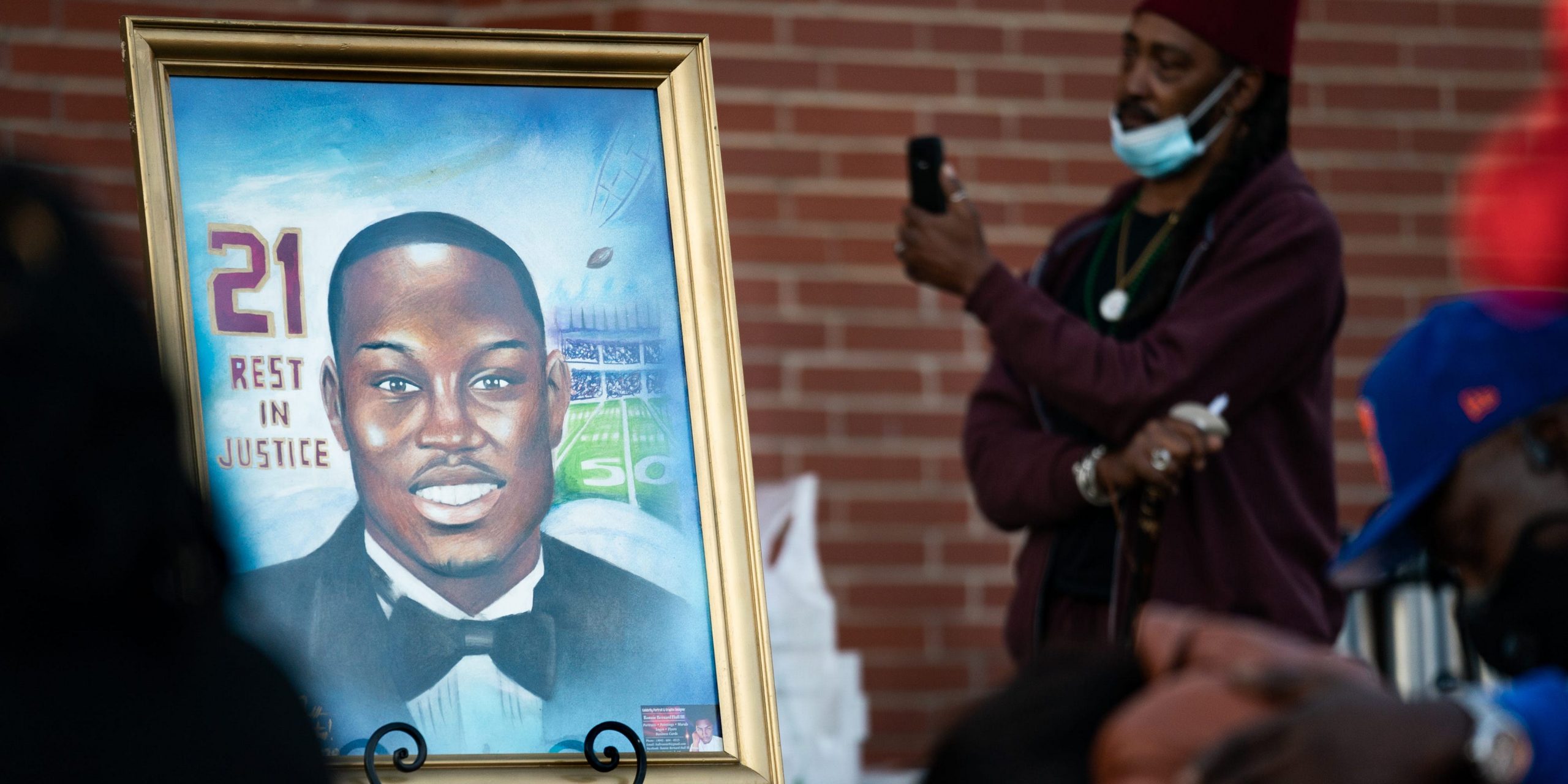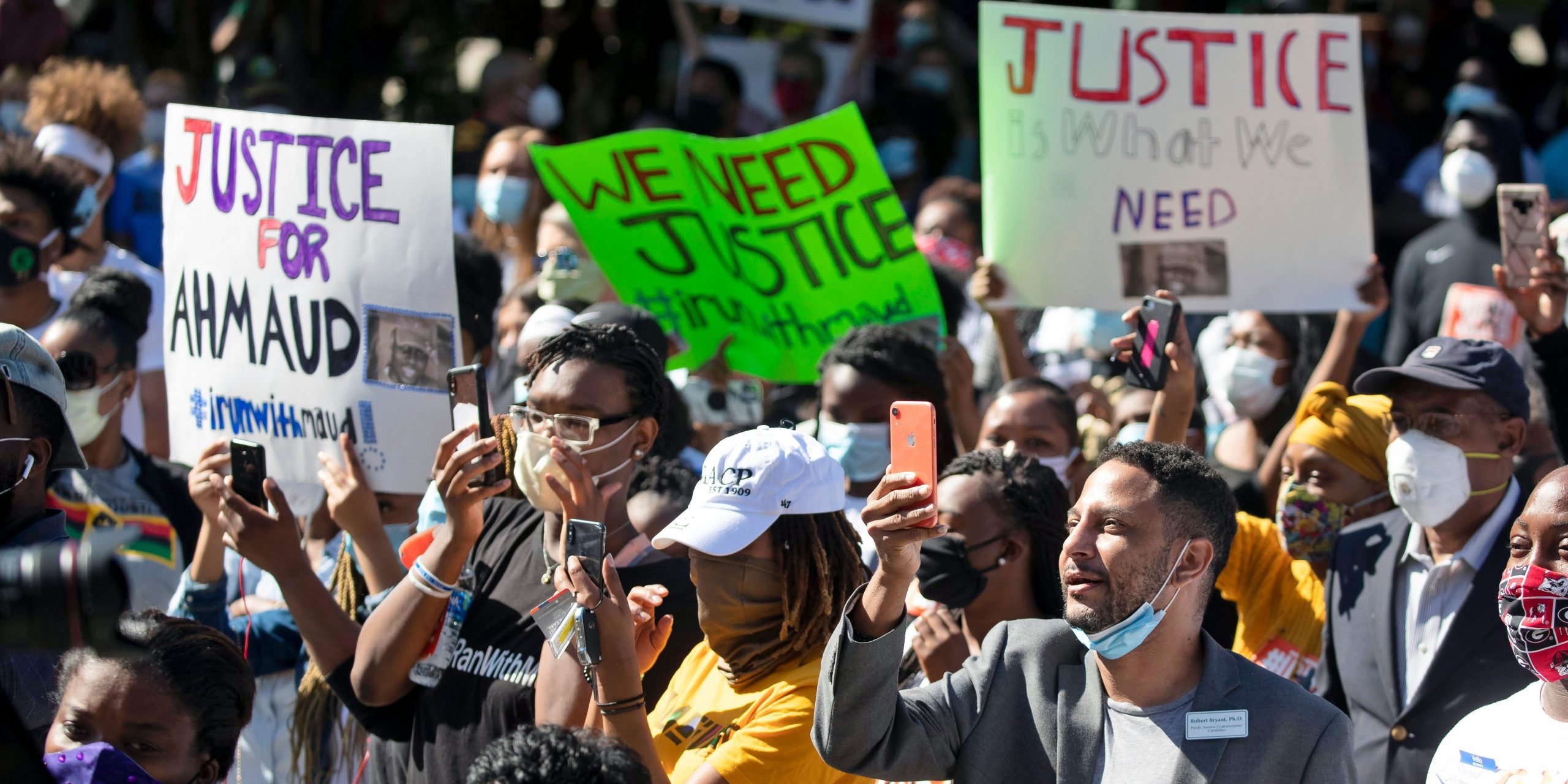
Photo by Sean Rayford/Getty Images
- The DOJ charged three white men with federal hate crimes in the death of Ahmaud Arbery last week.
- Experts say hate crime cases can be hard to win because prosecutors have to prove a defendant's motive.
- "We don't have a machine that can read suspects' minds," on expert told Insider.
- Visit Insider's homepage for more stories.
More than a year after Ahmaud Arbery, a 25-year-old Black man, was fatally shot while jogging in a Georgia neighborhood, the Justice Department has charged three white men accused of chasing him down, with federal hate crimes.
Gregory McMichael, a 65-year-old former police detective; his son Travis McMichael, 35; and William "Roddie" Bryan, 51, are accused of chasing, confronting, and shooting Arbery while he was jogging through the Satilla Shores neighborhood in Brunswick, Georgia, in February 2020.
Video of the confrontation, taken by Bryan, who prosecutors say joined the chase and blocked Arbery in between two vehicles, shows Arbery trying to run around the McMichaels' white truck, which is stopped in the middle of the road. Gregory McMichael can be seen standing in the back of the truck with his rifle, while Travis is outside of the vehicle with his shotgun. Arbery and Travis begin to fight over the weapon for a few seconds, and then Arbery collapses facedown on the pavement.
In addition to the new federal charges, the three men also face murder charges in their home state of Georgia, to which they have all pleaded not guilty. Attorneys for Travis have said he feared for his life and acted in self-defense, while an attorney for Bryan has claimed that he was not part of the chase and cooperated with authorities by disclosing footage of the incident.
Following the shooting, Gregory McMichael told a responding officer that Arbery had caught their attention because he resembled a man accused of a string of burglaries in the area. But police records show only one reported burglary in the neighborhood in the two months prior to Arbery's death, which involved a report of a stolen gun from a truck outside Travis McMichael's home.

Glynn County Detention Center via AP
But when the Justice Department indicted the three men on federal hate crime charges and attempted kidnapping charges last month, Arbery's family and activists across the country felt the indictment vindicated what they had believed to be true since Arbery's death: He was targeted because he was Black.
Defense attorneys for Gregory and Travis McMichael declined to comment on the federal hate crime charges. A representative for Bryan did not immediately respond to Insider's request for comment.
In a statement to NPR last month, attorneys Bob Rubin and Jason Sheffield representing Travis McMichael said, "that the Justice Department bought the false narrative that the media and state prosecutors have promulgated."
"There is absolutely nothing in the indictment that identifies how this is a federal hate crime and it ignores without apology that Georgia law allows a citizen to detain a person who was committing burglaries until police arrive," they said.
"Roddie Bryan has committed no crime," Bryan's attorney Kevin Gough told NPR in a statement. "We look forward to a fair and speedy trial, and to the day when Mr. Bryan is released and reunited with his family."
But Elizabeth OuYang, a civil rights attorney, advocate, and professor at New York University who specializes in hate crimes, said she thinks the federal hate crime charges in Arbery's death are appropriate.
"It smacks of racial profiling by civilians here," she told Insider.
Phyllis Gerstenfeld, a criminal justice professor at California State University Stanislaus and author of the leading textbook on hate crimes, agreed.
"I was pleasantly surprised, just because there have been very few federal hate crime prosecutions," she said. "I think it's justified."
But the experts told Insider that hate crime cases are notoriously difficult to win, and securing a conviction in Arbery's case could prove challenging.
Among all criminal laws, hate crimes are unique in that they require prosecutors to prove a defendant's motive beyond a reasonable doubt
In most cases, motive isn't a criminal element. While prosecutors will often try to establish motive in order to convince a jury of a defendant's guilt, proof of it isn't actually required to win a conviction.
But hate crime laws are in place to protect people who become victims of a crime specifically because of their membership in a protected group, which at the federal level includes race, religion, ethnicity, nationality, gender, sexual orientation, and gender identity. State hate crime laws' protected groups vary.
"What they're going to have to do to get a conviction, is prove that these individuals chose the victim at least partially because of his race," Gerstenfeld said.
OuYang agreed, saying the case will likely boil down to the defendants' intent behind targeting Arbery. If prosecutors can prove the McMichaels and Bryan chased Arbery down because he was Black, they may be able to secure a win.
But proving a person's motive can be extremely difficult.
"Whenever you have a situation where you have to be clear about somebody's motivations, that makes it harder to prove, because motivations are not easily observable," said Sarah Vinson, a forensic psychiatrist based in Georgia.
Hate crime convictions often prove elusive, Gerstenfeld said, and prosecutors tend to be hesitant to even bring hate crime cases to trial given the high standard of proof.
"We don't have a machine that can read suspects' minds," Gerstenfeld said. "We have to look at circumstantial evidence."
In a November hearing related to the murder charges, state prosecutors pointed to "racial" social media posts and text messages sent by the defendants in an effort to show that racism may have played a role in Arbery's death. Bryan, who also filmed the deadly confrontation on his phone, told authorities that Travis McMichael used the n-word after he shot Arbery, though McMichaels' lawyers have denied that claim.
OuYang said if evidence of potential racism is strong, it will play to prosecutors' benefit.
"It goes to [the defendants'] motive in the sense of their predisposition and attitudes," she said.
Arbery's death has left a permanent impact on Georgia's legal landscape
Georgia authorities' handling of the case sparked outrage last year after the case went months without any arrests or charges.
A district attorney in the state even told police that there were no grounds to arrest anyone for Arbery's death. He later recused himself from the case, but continued to defend the three suspects, claiming Arbery had "initiated the fight" and the McMichaels had been within their right to perform a "citizen's arrest."
Video of the deadly incident that went viral in the spring and increased attention from activists and lawmakers prompted the Georgia Bureau of Investigation to eventually step in. The McMichaels were arrested in May of 2020 and charged with murder and aggravated assault. According to the state, Travis fired the fatal shots. Bryan, who prosecutors say joined the chase and used his truck to trap Arbery, was arrested two weeks later and charged with felony murder and criminal attempt to commit false imprisonment.

AP Photo/John Bazemore
Before Arbery's death, Georgia remained one of only a few states without a hate crime law on the books. His death compounded with the racial justice movement that swept the nation last summer led to the addition of hate crime legislation in the state last June. But because Georgia's hate crime law was implemented after Arbery's accused killers had already been arrested and charged in Georgia, the men do not face hate crime charges at the state level.
Earlier this year, state lawmakers also approved a bill that would reform the state's Civil-War era "citizen's arrest" law that allowed private citizens to detain anyone they thought was committing a crime. Republican Gov. Brian Kemp has said he will sign the legislation into law.
Experts told Insider that the federal government likely stepped in, at least in part, to send a message
Gerstenfeld said federal prosecutors will often refrain from bringing federal charges in a case if they feel the state has it "adequately covered."
That the Justice Department did bring charges in Arbery's death, may be telling.
"I think it is to [send a message,]" OuYang said. "I think a message needs to be sent. This is an egregious case. Someone in broad daylight jogging on public streets of Georgia has a right to be able to do that and I think it sends a strong message that these rights need to be protected."
A Georgia judge on Friday scheduled the state's murder trial for the three men for October, according to local media. Superior Court Judge Timothy Walmsley issued a notice saying jury selection will begin October 18, and the trial will commence soon after.
No date has been set for the federal trial, but if the defendants are convicted with the maximum sentence in Georgia, OuYang said federal prosecutors could potentially drop their charges.
Even if Arbery's accused killers are not eventually convicted of a hate crime, Vinson said the charges are still meaningful.
"I don't know how much people wanting the federal involvement was because of a really deep understanding of what that means or how feasible it would be to get a conviction," Vinson said. "Versus some recognition...that people will be held accountable."